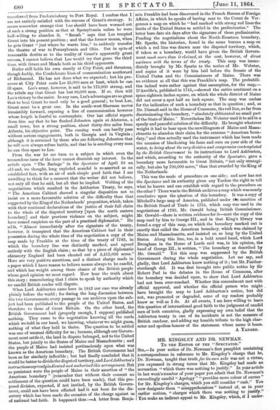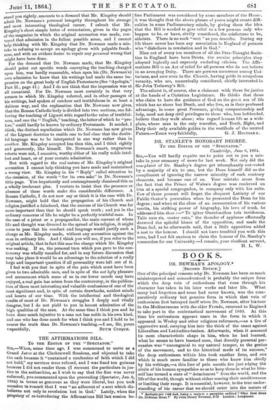DIR. KINGSLEY AND DR. NEWMAN.
To THE EDITOR OF THE "SPECTATOR."
Ste,—In your notice of Dr. Newman's first pamphlet containing a correspondence in reference to Mr. Kingsley's charge that he, Dr. Newman, taught that truth for its own sake was not a virtue, you expressed in strong terms that Mr. Kingsley had made an accusation "which there was nothing to justify." In your article in last week's number of your paper you admit that Dr. Newman's exceedingly candid " Apology " "provides more colour of excuse" for Mr. Kingsley's charges, which you still consider "rash." You now designate them " misapprehensions " instead of, as in your earlier notices, "charges which there was nothing to justify." You make an indirect appeal to Mr. Kingsley, which, if I under- stand you rightly, amounts to a demand that Mr. Kingsley should admit Dr. Newman's personal integrity throughout his strange and most interesting theological career. I submit that Mr. gingsley's short simple letter of retractation, given in the pages of the magazine in which the original accusation was made, con- veyed that admission in the fullest possible sense, and I cannot help thinking with Mr. Kingsley that Dr. Newman made a mis- take in refusing to accept an apology given with palpable frank- ness, and with an evident desire to repair any personal wrong that might have been done.
For the demand that Dr. Newman made, that Mr. Kingsley should point out specific words conveying the teaching charged upon him, was hardly reasonable, when upon his (Dr. Newman's) own admission he knew that his writings had made the same im- pression on the great body of English Protestants (See "Apologia," Part IL, page 41.) And I do not think that the impression was at all unnatural. For Dr. Newman most certainly in that very sermon to which Mr. Kingsley referred, and in other passages of his writings, had spoken of candour and truthfulness in at least a dubious way, and the explanation that Dr. Newman now gives, that the Roman Catholic body is divided into two sections, one fol- lowing the teaching of Liguori with regardto the value of truthful- ness, and one the "English," teaching, the latter of which he "pre- fers," could hardly be known by ordinary Protestants. It needed, I think, the distinct repudiation which Dr. Newman has now given of the Liguori doctrine to enable one to feel clear that the doubt- ful language was to be interpreted in one way rather than in another. Mr. Kingsley accepted less than this, and I think rightly and generously, like himself. Dr. Newman's smart, ungracious retorts were not, I conceive, worthy either of his really noble intel- lect and heart, or of your ecstatic admiration.
But with regard to the real nature of Mr. Kingsley's original accusation I cannot help thinking you have made and maintained a wrong view. Mr. Kingsley in his "Reply" called attention to the omission, of the words "for its own sake" in Dr. Newman's title-page. You impatiently and contemptuously dismissed this as a wholly irrelevant plea. I venture to insist that the presence or absence of these words make this considerable difference. A Roman Catholic, I do not now say or think it is the case with Dr. Newman, might hold that the propagation of his Church and religion justified a falsehood, that the success of his Church was fax more important than that he should speak truth ; and yet in the ordinary concerns of life he might be a perfectly truthful man. In the case of a priest or a propagandist, the main current of whose life and thought was directed to the spread of his religion, it might come to pass that his conduct and language would justify such a charge as Mr. Kingsley made, without any accusation against the man in ordinary life. And I think you will see, if you refer to the original article, that in fact this was the charge which Mr. Kingsley was making. If so, the personal turn which you gave to the con- troversy was wholly uncalled for, and in any future discussion that may take place it would be an advantage to the solution of a really large and important question if all personality were left out of it.
I feel with you that in spite of the pain which must have been given to two admirable men, and in spite of the not lofty pleasure and amusement which some of us in our lower moods may have enjoyed, a real gain has arisen from the controversy, in the publica- tion of these most interesting and valuable confessions of one of the most significant and, in spite of certain drawbacks, noblest minds and hearts of our time. With the intellectual and theological results of most of Dr. Newman's struggles I deeply and vitally disagree, but I do not yield to you in honest admiration of the high qualities of the man. At the same time I think you and he have done much injustice to a man not lees noble in his own kind, and one who has done much for what I think you and I hold to be nearer the truth than Dr. Newman's teaching.—I am, Sir, yours





























 Previous page
Previous page